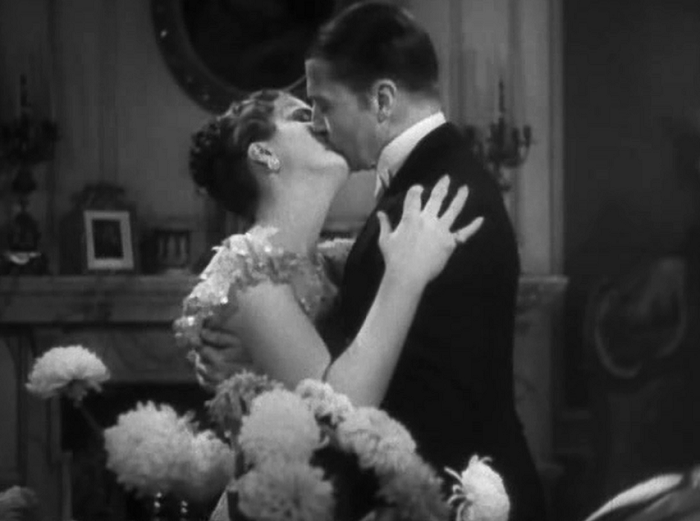
Proof That It’s Pre-Code
- One of our white bread heroes goes into a starlet’s changing room to wait for her, and then accidentally watches her strip down. Accidentally. Yeah.
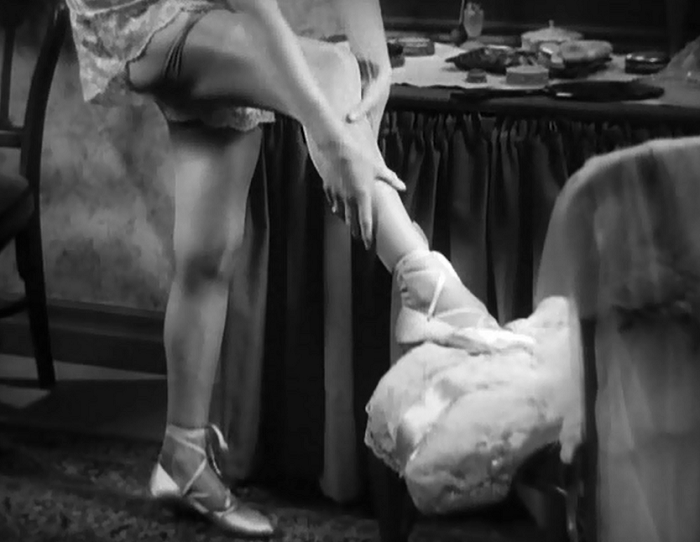
She’s got legs, and I know how to screencap them…
- There’s a few shots near the end of the movies portraying the 20’s where we get a couple of quick moments at a rollicking party. This includes a moment between two women (one wearing a swanky monocle!) and a moment between two men (exchanging a wristwatch! this is less impressive!) that looks awfully… you know. Gay. QED:
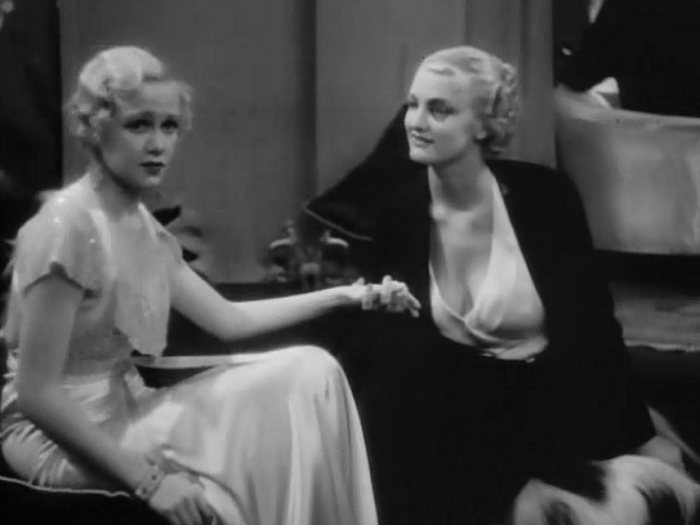
Monocle = dangerous, sexy, possibly German.
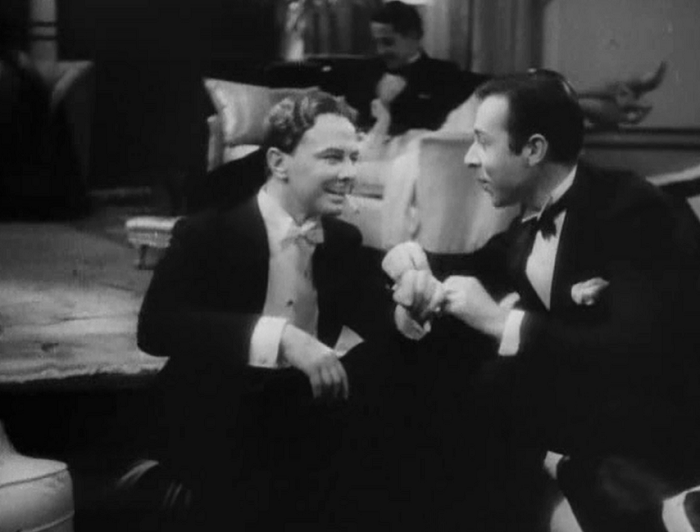
Watch = suggestive, thoughtful, possibly Swiss.
The Particulars of the Picture
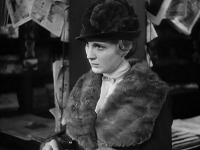 |
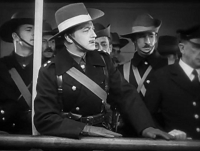 |
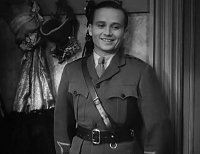 |
| Jane Marryot … Diane Wynyard |
Robert Marryot … Clive Brook |
Joe Marryot … Frank Lawton |
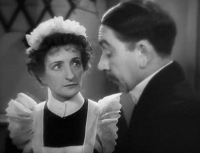 |
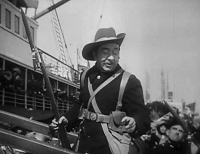 |
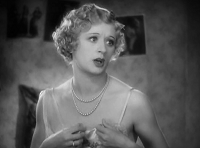 |
| Ellen Bridges … Una O’Connor |
Alfred Bridges … Herbert Mundin |
Fanny Bridges … Ursula Jeans |
Cavalcade: Above All Else, Keeping the Upper Lip Stiff
“We have to have wars now and then to prove that we’re top dog!”
A few weeks ago I had to restrain myself when I was discussing Grand Hotel; I almost called it the Pre-Code equivalent to 2012’s big hit, The Avengers, until I realized that my metaphor would probably fall apart once I started drawing parallels between Garbo and the Hulk. That, and for all of Grand Hotel’s faults, it’s not a commercially calculated completely empty blockbuster that’s an insult to the intelligence of anyone who watches it.
Now Cavalcade, on the other hand, strikes just that note. Big grand things happen, exploiting recent history in an attempt to be hip and relevant, and carefully avoiding any commentary in order to draw in the biggest audience possible while simultaneously dodging any emotional baggage that could cause the viewer to think or feel and thus ruin the experience of blandness.
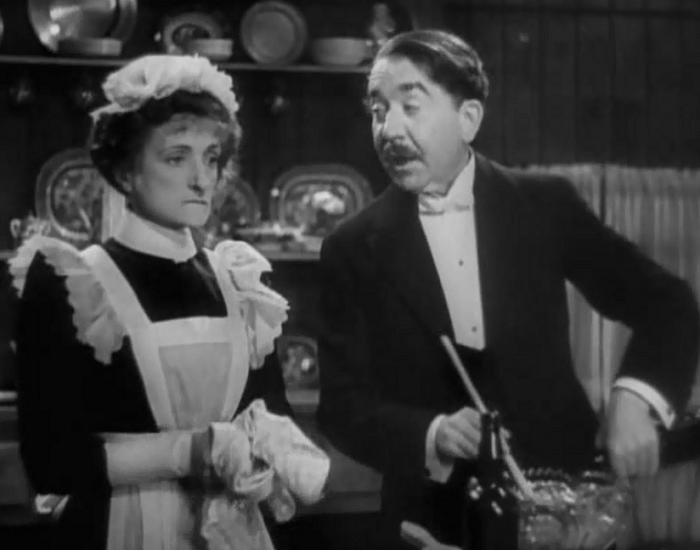
How the lower half, uh, serves food.
That being said, at least I didn’t dislike The Avengers. It may represent some sort of depressing cultural nadir that demonstrates the end of imagination and the coming homogenization of society as we continue to be churned into nothing but statistics by increasingly powerful and unregulated corporations, but, hey, I can appreciate Robert Downey Jr as much as the next man.
Cavalcade, on the other hand, offers more meager rewards. A generational tale chronicling two British families from 1899 to 1930, Cavalcade is based on a stage play by Noel Coward. Director Frank Lloyd goes opulent to cover up its stage roots, turning it into a movie filled with crowds, both roaring and hissing.
Unfortunately, while Lloyd does a good job of visually distinguishing it from the theatre, he has far less luck with his actors. Clive Brook and Diane Wynyard are both stage actors first and foremost, and as the upper crust leads of the film their constant ‘play to the rafters’ style of acting is immediately grating. It adds an airy sense of detachment to their characters, and when presented with characters who we’re going to follow through three decades, detachment is a bad idea.
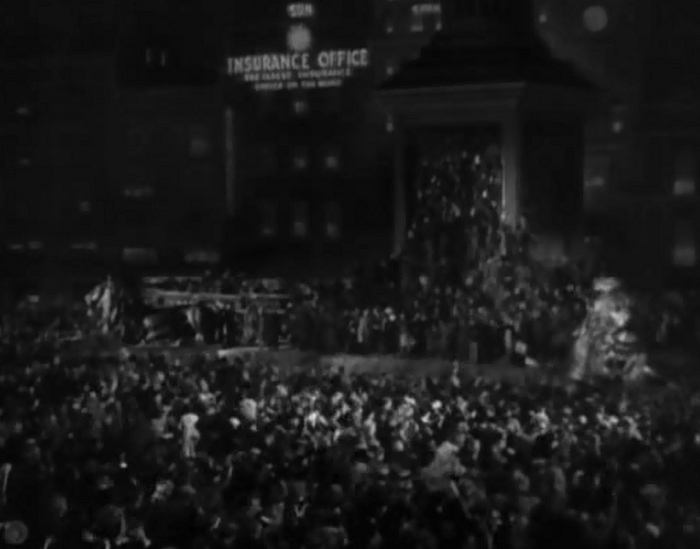
Huge operatic sets!
But Coward’s play also deals in detachment, choosing to spy in on characters at fateful moments then whisking away to find them again settling in before a tragedy. Brook and Wynyard play Robert and Jane Marryot, a well-off British couple with two healthy sons. Our movie swoops in at the turn of the century, and shortly after their celebration we find that Robert is being sent off to serve in the Second Boer War.
The Boer War is one of those wars of imperialism that so many empires of the time liked to indulge in, and it featured one of the first instances of a global power using concentration camps to slaughter those who disagreed with them. This does not come up in Cavalcade; in fact, in Cavalcade, the Boer war is the ‘good’ war. Patriots march off and return home, better and happier than before.
Like Cimarron from a few weeks back, Cavalcade endeavors to be a stirring epic that tells of how quickly the world evolves. While the Boer War is the good war, we’ll inevitably hit a bad one, and the Marryot’s happiness will reflect the fortunes of Britain herself.
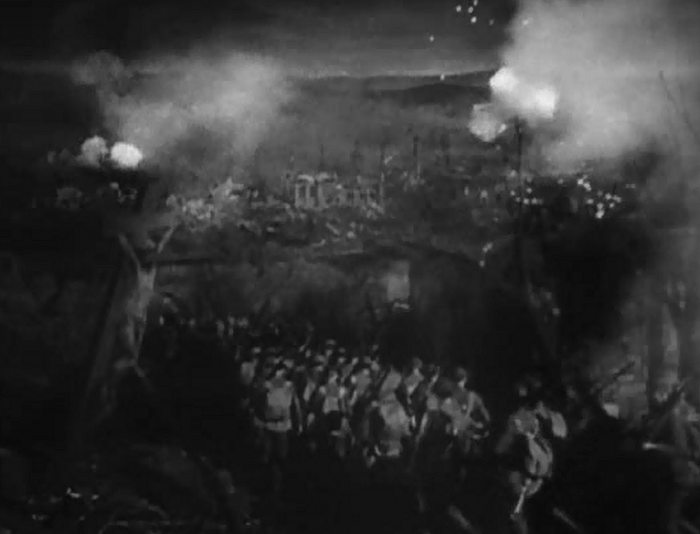
Uh oh, this looks like a bad war.
Cavalcade also pretends to be one of those class dramas, where half of the action is with the bourgeois Marryots and the other half happens with their servants, the Bridges. The men of both family heads off to South Africa to suppress resistance, and come back as heroes; Robert is knighted, and Alfred Bridges has amassed enough money to buy his own pub.
The stories split off here, as the Bridges move onto their own and their daughter and the Marryots’ young sons grow up. Edward Marryot falls for his childhood sweetheart, Joey starts liking showgirls. Meanwhile, Alfred Bridges becomes a drunkard and is killed and the Bridge’s daughter, Fanny, becomes a famous skirt dancer.
Do you sense the emotional impact from Alfred’s demise? Yeah, that’s about what we get from the movie, too. It’s often a series of anticlimactic moments dotted by long bits of meaningless speechifying. Worse, the movie suffers from the Forrest Gump syndrome where our characters happen to be present at momentous early 20th century events, only the point in Cavalcade is tragedy rather than satire.
I’ll give you an example that pretty much sums up all of my problems with the movie. A title card comes up reading April 14, 1912. We pan a magnificent ocean liner, a set that had to be three stories tall, filled with people talking behind windows and enjoying their merriment. Out on a secluded balcony, Edward and his new bride are talking about the wonders of life. She posits that she would be okay dying today, as she don’t think they could possibly be any happier. Their flirtations continue for at least another minute or two as they make their way from their perch– the camera lingers.
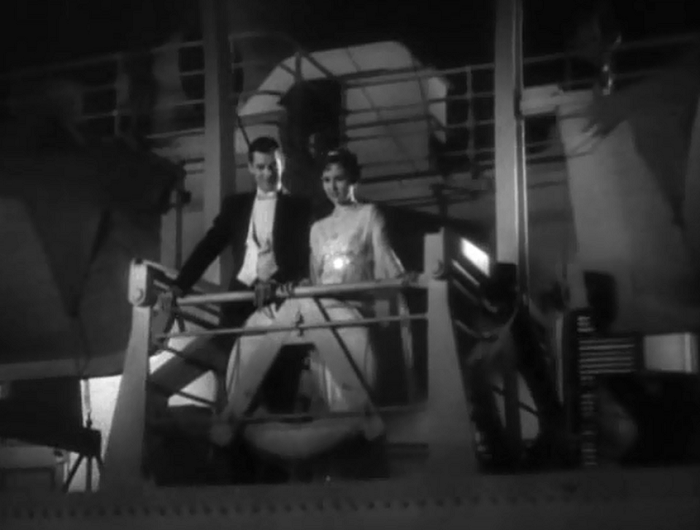
“These characters have expressed nothing but romantic platitudes in generic ways! What could possibly go wrong?”
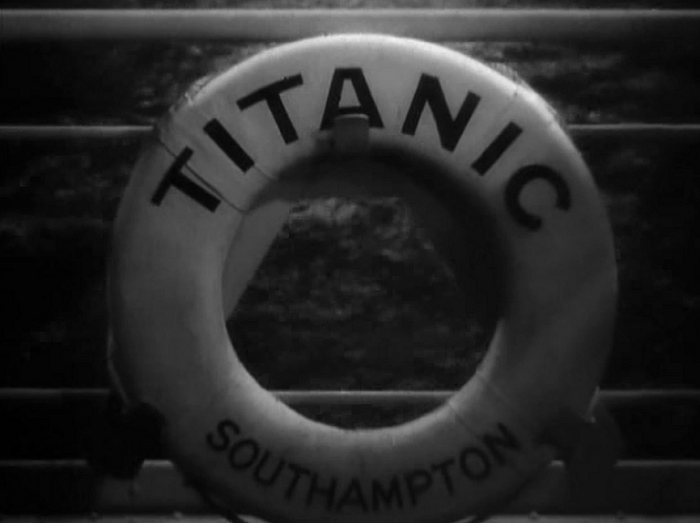
“…..ohhhhh.”
Pan down to the words H.M.S. Titanic written on a life preserver. Whoa! Did you see that? They had all those poignant things to say about death and life and it turns out they were on the Titanic?
The film then flashes forward five years, on the eve of The Great War, and everyone is busy worrying about that. Joe muses that he’s sad that Edward has passed on and missed his chance to go to war, and everyone is touched for a half a second but moves on. This brings me to my point; there is no point to this. Edward’s death is an emotional cul de sac for the film, existing as a means to the end and moreso as a cheap punchline.
This anticlimactic sense of character’s lives ending and changing permeates the movie, as major world changing events occur and this family is ripped apart by the veritable end of empire, but each death is treated with the minimum amount of gravitas. (Yes, that word.) Any death that occurs is rarely mentioned again, resulting in a series of events and climaxes with no flow. Like the Titanic reveal, it’s all bad jokes without punchlines. Long passionate appraisals that are earnest to a fault; no room for real emotion present. Because of the lack of emotional connections, both stories just fizzle out by the end.
The film’s leisurely pace is also a problem, feeling about twice as long as its 2 hour length. The film is also adrift inlong, slow musical numbers for significant periods of time. None of the songs are memorable, and their presentation more or less consists of the audience watching a person sing. With no choreography and nothing to listen to, it becomes white noise.
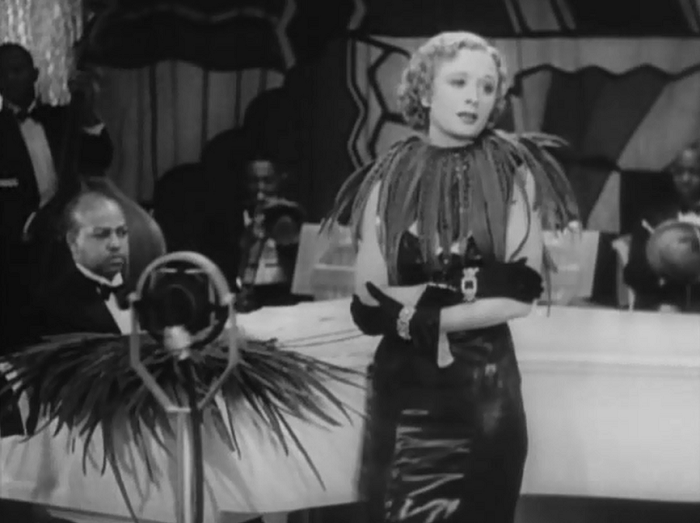
Lots and lots of white noise. Killing the momentum. Of the movie.
Having said all that, the biggest issue I have with Cavalcade– which is about the biggest I can have in a movie that’s not boring– is that the film contains a few minutes of actual powerful ideas, where, had they been followed through on, could have created a film far more lasting than this.
I’m going to talk about spoilers real quick, so skip to “Done with spoilers” text to miss out on them.
The end of the film sees Joey and Fanny fall in love with each other, even as Joey heads off to the first World War. There’s a a pretty good montage of the horror of the war– from the optimistic beginnings as patriotic music blares until the bitter end where it’s drowned out by explosions. Nothing great, but it at least tries for an emotional connection, and for the audience of the time, that may have been enough.
We follow Joey as he comes home for his last leave before the big push to end the war. He asks Fanny to marry him, he sees his mother. This is a big chunk of film, and anyone worth a damn has to know that we’re seeing all this is because Joey is about to bite the bullet in the very last seconds of the war. Like most of the movie, its lack of narrative ingenuity and stolid characters make the drama leaden.
Jane hears about her only remaining son’s death on the eve of the armistice, and faints. That evening she can do nothing but wander the streets through the celebratory crowd– this is the only time in the movie we actually see one character mourn another one– but her train of thought is disrupted by a reveler. Realizing what the victory means for England and her way of life, she lets go and twirls a noise maker… before the memory of what she’s lost for it comes back.
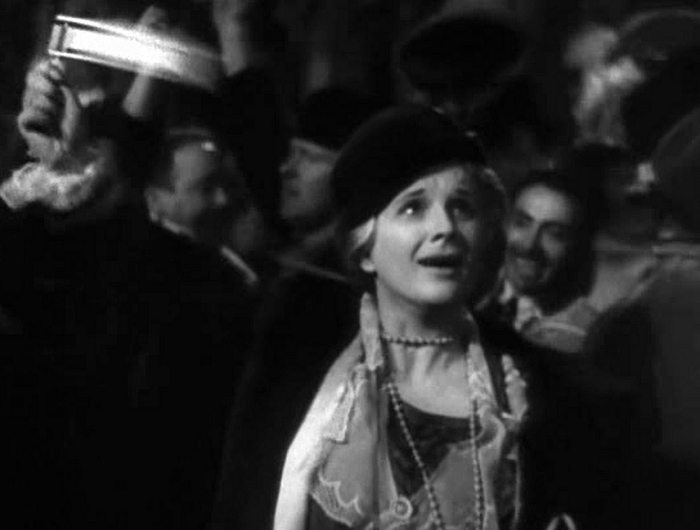
Beautiful.
It’s a beautiful, brilliant little moment, made all the better since Wynyard doesn’t have to deliver a single line throughout it. It says something about glory and loss, and asks whether this woman’s pain is worth the crazy direction Britain is headed.
The problem is that this moment, the climactic one, comes with about twenty minutes of film left. We’re treated to another montage and long musical number, both emphasizing a sense of unease with the 20th century so far. Men shout at the screen about building up chemical stockpiles, how the end times are coming, etc.
We rendezvous with the Jane and Robert again, alone on New Years 1930. If you think there will be any deep introspection about loss or optimism after losing two sons and almost seeing their way of life obliterated, then you haven’t heard all the wheezy dialogue Coward has been lobbing throughout the film. Take this exchange:
“I believe in the future.”
“That’s your way, darling. I believe in the future, too. Just not in the same way.”
What does this mean? Both are too polite to say, overcome with nostalgia and watching the revelers burst once more into a long rendition of “Auld Lang Syne”. These final shots, which flashback to the montage from only a few minutes prior, either indicates hope or unease about the future.
That the film’s content and final moments can’t seem to commit to either interpretation is deeply frustrating. Reading reviews of the film, half declared this anti-war, others talk about its glorification of England. This film is so incredibly bland that it’s only message boils down to the fact that England will endure. Considering all of the empty platitudes thrown around, it seems that English endurance is based solely on it being so inoffensive and dull that no one should even bother wiping it off the map.
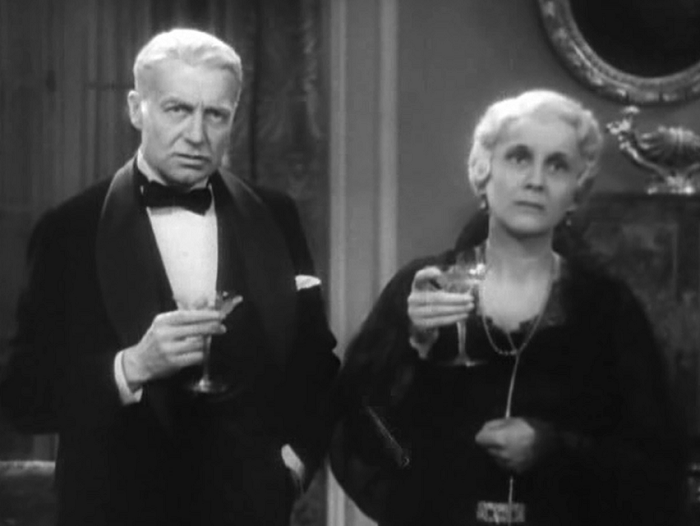
“To the future! Uh, I guess! Maybe? Is this optimistic or not, I can’t tell.”
Done with spoilers.
Please note that I don’t hate British people at all (and it’s always a good sign when you realize you should probably clarify this in the middle of your film review), and I will note that Cavalcade was enormously popular, with critics and audiences, in the United States. The ideas behind Cavalcade are interesting, but, not being British, I can’t say that I found the proceedings as compelling as the events of Cimarron. Even with its one excellent scene, that interminable business on the Titanic is enough to make me rue the years spent watching it.
Cavalcade is a long, inane series of people who are mostly happy and sometimes sad, but mostly it serves as a dirge of earnest speechifying. It has not aged well.
Trivia & Links
- Okay, so there’s the character of Fanny Bridges here, only, with the British accents being what they are, I thought her name was ‘Fanny Britches’. Since ‘Fanny’ is British slang for the female genitalia, I spent 90% of the film thinking Noel Coward had named one of his characters, essentially, ‘Vagina Pants.’ This was my favorite part of the movie.
- The IMDB Trivia notes that this is the rare Noel Coward play that hasn’t been revived since its original run. The page posits that this may be because of the scope; I helpfully posit that this play is very much tied to the time it was made in and wouldn’t translate well for modern audiences.
- TCMDB has a really detailed article about the film’s background and creation. Noel Coward was knighted for this play! Also, there was a lot of discussion about how to neuter the movie a bit; less pessimism, less dialogue, more pizzazz. There’s also a good discussion about how much penny ante crap the studio had to go through to get the words ‘damn’ and ‘hell’ into the picture.
- Another article on TCMDB (because they never consolidate those things) talks about the critical reception, and how Coward himself never seemed to have the same feelings about it twice. Hell, he seemed to draw different morals from it every time too.
- Maryann Johanson actually names the Titanic scene as the film’s most unforgettable one, though I really wonder if that’s for the same reason I think it’s unforgettable.
- James Bernadelli over at Reelviews is proving invaluable as I go through these movies as he provides background information galore. He actually likes Cavalcade, though, and I don’t really… get… that.
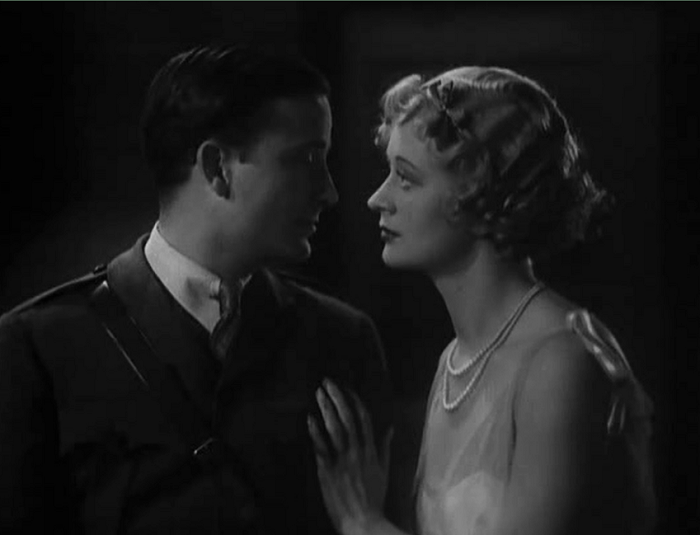
Here’s another picture. I hate huge blocks of text, don’t you?
- Okay, this site’s images don’t work for some reason, but 411mania has a really good review of the picture up here. I actually read it and got annoyed because it touches on many of the same things I was planning on discussing.
- Mordaunt Hall’s contemporary review in the New York Times, of course, loved it.
- Google has an article from The Gettysburg Times where columnist George Matthew Adams goes on a tear about the movie’s anti-war message. Proving that even in the 1930’s, newspaper columnists were completely loopy. His last paragraph is a hoot:
If there is to be a League of Nations, let its dominant purpose be a League of Love! Cooperation and understanding alone, beside this principle, can save the world and make every nation great and all people happy.
Availability
- Do you want to see Cavalcade? Sure, we all do. Enjoy it on VHS, since that’s pretty much the only way to get it (released in 1996!), or watch the cable movie networks for a rare showing. I couldn’t even find it on YouTube.





11 Comments
brianpaige · June 19, 2013 at 4:02 pm
This movie sucks, it sucks, it really really sucks! One of the worst movies ever to win best picture. Hearing these pompous Brits blathering on the ship made me glad when I realized it was the Titanic.
Danny · June 19, 2013 at 4:42 pm
It works better as a punchline than as a dramatic beat, that’s for damn sure. And, yes, while Cimarron is certainly it’s own brand of painful, it has nothing on this.
Jeff Heise · July 16, 2013 at 8:16 am
I saw this film years ago at a special screening at the Motion Picture Academy, and Ron Haver was just ahead of me in the lobby. I had heard of the film but had never known anyone who had seen it and I asked Ron if he had seen it. He said yes and quickly gave a thumbs down and an enormous “razzberry,” which is pretty much my reaction to the film. I remember the audience giving a big “whoooooo” when the Titanic reveal happened (since I am both a history and Titanic buff and I knew the period of the film, as soon as I saw British couple/on their honeymoon/early 1910’s/on board a ship, I knew it was the Titanic and that at least one would die.
I think Diana Wynard is one of the most boring actresses to ever appear in a film-for evidence, see both MEN MUST FIGHT-an anti-war polemic made by MGM in 1933 in which she plays a woman who, after too many people she loves becomes such a strident hater of war that she makes all those anti-Vietnam protesters seem like war hawks; and ONE MORE RIVER, the only James Whale film I have yet to see that bores me to tears and another “veddy British” domestic drama along the lines of CAVALCADE. The former sometimes shows up on TCM when they salute Lewis Stone or Robert Young, and since Universal owns the latter its screenings are rare, but TCM might show it sometime.
CAVALCADE is-along with THE GREAT ZIEGFELD and CRASH-the worst Best Picture Oscar winner.
Danny · July 16, 2013 at 3:23 pm
The Titanic reveal is painfully obvious. It’s the only time in the film where an exact date is given rather than a year, which is pretty much saying ‘GUESS SOMETHING BAD HAPPENS TOMORROW’. The platitudes on the boat are also quite grating, and are filled with so much obvious and bad dramatic foreshadowing it’s a wonder people didn’t get up and leave afterward.
I have my own list of the least enjoyable best picture winners, and this one is at the top. Definitely a ‘you had to be there’ sort of film to appreciate, immortalized forever by its Academy Award.
shadowsandsatin · May 19, 2014 at 10:59 pm
Ugh — I’m so glad to read that I’m not alone in my feeling about this movie. I had been wanting (longing!) to see it for a couple of years, but had somehow kept missing it on TCM. When I finally taped it and eagerly sat down to watch, I was like, what. Good Lord. I have to be honest — I couldn’t even finish it. I just didn’t give a damn. Thanks for this excellent, on-target, and hilarious write-up.
Danny · May 20, 2014 at 8:02 pm
It’s baffling. Whenever I see someone talk about how great Cavalcade is, I’m convinced that there has to be another movie with the same title that I must be confusing it with. It’s just so frustrating!
drush76 · January 24, 2016 at 2:50 am
“THE AVENGERS” was just a comic book movie and did not make any pretentious attempts to take itself seriously . . . unlike “CAVALCADE”. I thought this 1933 Best Picture winner was a boring mess . . . and pretentious to boot.
Mike Gebert · February 15, 2017 at 1:28 pm
It’s interesting, well into the 1950s if people in the biz were asked what the greatest film of all time was, a fair number would name Cavalcade. I think its reputation for being about the important stuff of the early 20th century was sustained in part by no one having seen it for years. But as you say, it has little enough to say about any of it, just marking it– which is very much like the empty-headed historical pageantry of Forrest Gump.
The big problem with Cavalcade for me, apart from its stiffness, was that it is very snobby toward the downstairs crowd, which just makes us dislike the upstairs crowd even more. It is interesting that less than a decade later, as WWII arrived, Coward did a complete 180 on that– nobody loved “we’re all in this together, Englishmen” stories more than he did, as in In Which We Serve. In fact This Happy Breed, which is about a middle class family over the years, is pretty much a remake of Cavalcade, set one class level down– and a much better movie, not only because David Lean is a better director but because the characters are much more approachable and likable.
Janine Bailey · October 31, 2020 at 6:59 pm
Coward did NOT receive his knighthood for this movie… Churchill blocked his proposed knighthood in 1938…He was awarded his honorific title in the Queen’s New Years Honours list 1970… it was awarded for a lifetime of high achievement and services to the arts and charities. Thank you.
Comments are closed.